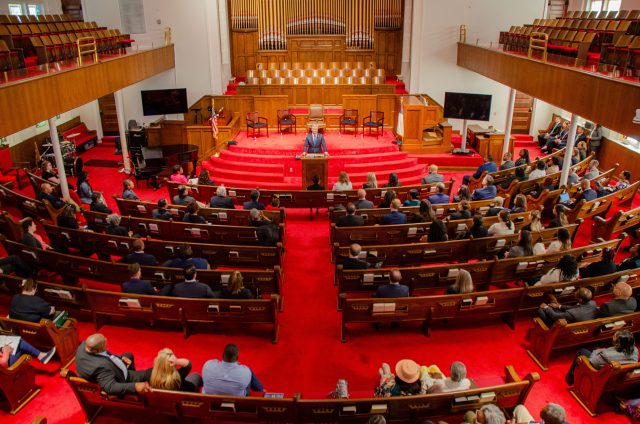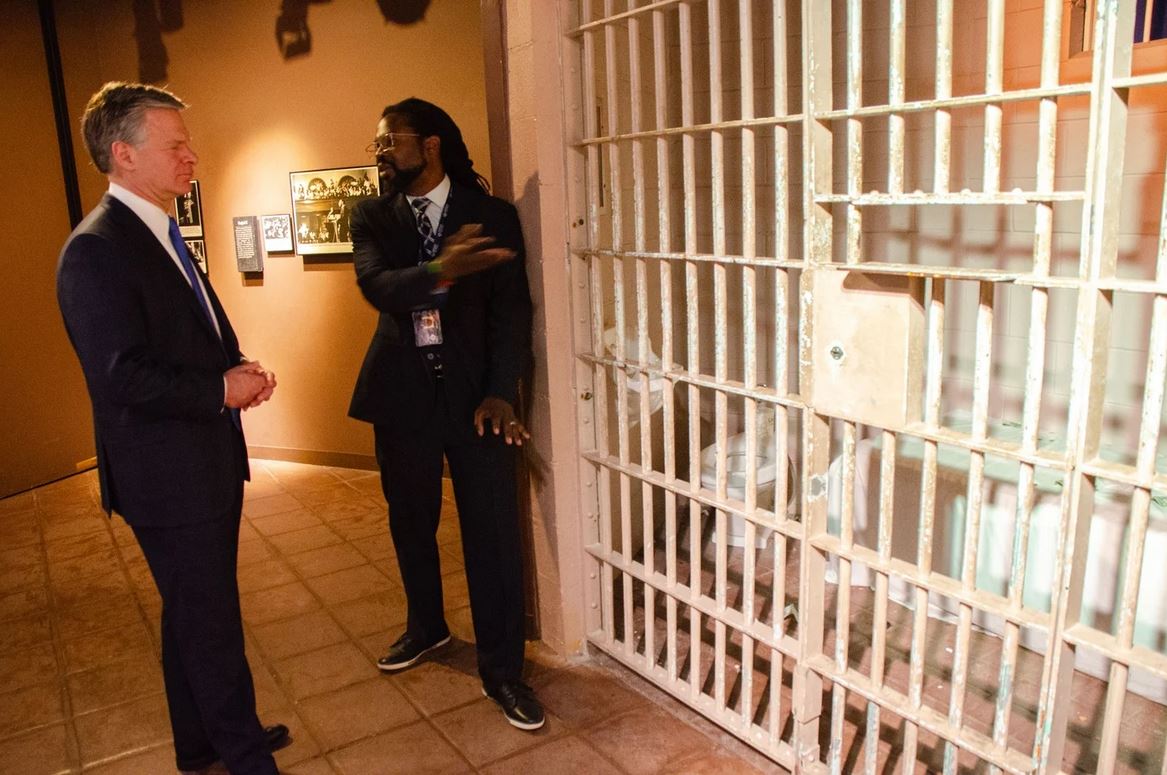
fbi.gov
FBI Director Christopher Wray summoned the words of Civil Rights leader Dr. Martin Luther King Jr. in a speech Monday in Birmingham, Alabama encouraging Civil Rights activists and law enforcement leaders to forge ahead in their fight for justice despite the persistence of violent, bias-motivated hate crimes.
Speaking from the pulpit of the 16th Street Baptist Church in Birmingham—where four young girls were killed in a bombing in 1963 that shocked the nation and galvanized support for the Civil Rights Movement—Wray referenced a speech Dr. King delivered in 1965 to a weary audience. It was 18 days after Bloody Sunday, and they had just marched 54 miles from the city of Selma. The minister famously said, “The arc of the moral universe is long, but it bends toward justice.”
“A lot of people have used [King’s quote] to talk about how Civil Rights causes have slowly improved,” Wray said. “He was not saying justice is inevitable. He was saying the long arc of the moral universe bends towards justice. And it does so because people—like those on that march, and those here today—act to bend it that way.”
The Director’s remarks set the tone for the Birmingham Civil Rights Conference, a gathering of law enforcement and Civil Rights leaders that dates back to 2006 and is organized by the FBI’s Birmingham Field Office, the Department of Justice, and the Birmingham Civil Rights Institute, a cultural and educational research center that highlights Birmingham’s place in the Civil Rights Movement.
The conference provides training models for agents and officers and leading voices in the communities where they serve. The theme is “The Trauma of Crime & Hate.” Discussions during the two-day conference are wide-ranging but are ultimately designed to build trust.
“Today’s FBI understands how our past led to our present, meaning we take incredible care to earn and to be deserving of the trust invested in us with the authorities we have,” Wray said, “and we make sure that we’ve got the capabilities to respond when hate rears its head in the future.”

Wray’s 30-minute speech examined the difficult path of social justice over the last 60 years, including the Sept. 15, 1963, church bombing that killed Carole Robertson, Addie Mae Collins, Cynthia Wesley, and Denise McNair. He described in detail the Tops Supermarket shooting in 2022 that killed 10 Black people in Buffalo, New York; a frightening race-based harassment case in Montana; a betrayal of the badge by a corrections officer in Alabama, and the “heinous” torture last year of two Black Mississippi men by six white law enforcement officers.
“It’s a discredit to those scores and scores of brave men and women who do the job the right way, each and every day,” Wray said. “When law enforcement or corrections officers operate as though they’re above the law, they’re not just depriving victims of their civil rights; they’re degrading the public’s trust in everyone else in law enforcement, and in our criminal justice system as a whole, one violation at a time.”
There were more hate crimes charges last year than in any year since turn of century, the Director said. In the case examples he provided, Wray described outcomes that showed justice ultimately prevailing.
The shooter in the Tops Supermarket case received multiple life sentences and still faces 27 federal charges, including 13 for hate crimes. The six police officers in Mississippi who mercilessly tortured two men and then tried to cover it up pleaded guilty last August amid a mountain of evidence collected in the color-of-law investigation by our Jackson Division. Their sentences, handed down just a few weeks ago, range from 10 to 40 years. FBI Birmingham’s investigation of the corrections officer who beat a 60-year-old inmate to death uncovered a trail of evidence that compelled him to plead guilty last December. He is now behind bars in a federal prisoner serving a seven-year sentence.
“Hate crimes are messenger crimes. They intend to incite terror,” Kristen Clarke, Assistant Attorney General for Civil Rights, said in her remarks. “Our prosecutions are sending a louder message that hate crimes will not be tolerated.”
“No one is above the law,” Wray said, “And the FBI will continue investigating color-of-law abuses as one of our most important responsibilities.”

Wray thanked everyone at the Civil Rights conference for putting in the work and “bending the world towards justice.”
“Looking back across the 61 years since this church—and the ideas and the movement it stood for—were attacked by four men with hate in their hearts, I see progress towards a better present and a more hopeful future,” Wray said. “I see that your work, and the work of many before us, has changed society—has bent the arc—so that when hateful acts occur, rather than obscuring that ugliness and protecting those who inflicted it, people instead shine a light on it, and we can move more swiftly to get justice.”




